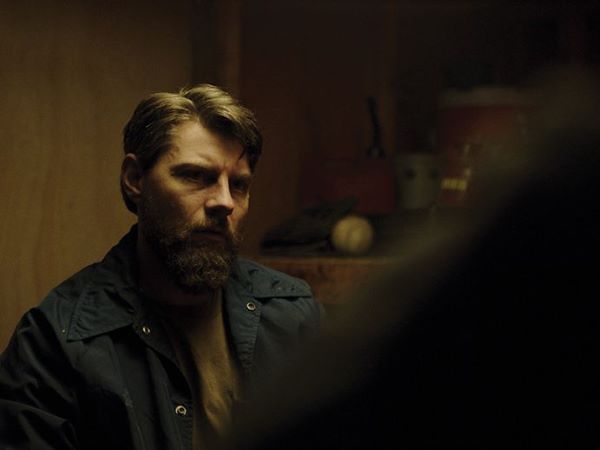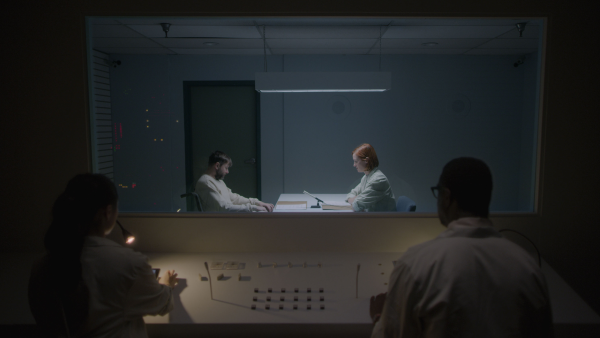
A year ago, the Tribeca Film Festival, like many media events in 2020, was cancelled because of the coronavirus pandemic, a real-life dystopian movie plot straight out of Contagion. Now Tribeca is officially back in-person and online, and to celebrate, moviegoers can treat themselves to a slate of 66 features films. These include stories about the unknown, the macabre, and the potentially supernatural, all perfect for those seeking catharsis post-2020. Here are a few notable horror/sci-fi titles from this year’s festival that are still available to stream in the United States.
My Heart Can’t Beat Unless You Tell It To
Jonathan Cuartas’s debut feature is a family tragedy disguised as a monster movie. It’s about a quartet—three brothers and one sister—who live by themselves in a house boarded up from the inside and weirdly decorated with Christmas lights in springtime. The reason: the youngest brother, Thomas (Owen Campbell), is sickly and vampiric, so his older siblings Dwight (Patrick Fugit) and Jessie (Ingrid Schram) regularly bring “strays” (homeless men) to their house, where they are knocked out, bled dry, and fed to Thomas for sustenance. Jesse seems content to live this lifestyle out for Thomas’s sake, but not Dwight; he’s getting tired of it all.
When Dwight’s not acting as a murdering caretaker, he’s selling scrap and fabric at a local thrift store for cash and spending his free time with a local prostitute. She gives him a brief taste of freedom and happiness, yet he can’t leave his household. Jessie constantly guilts Dwight into putting family first. Even when Dwight forms a brief emotional connections to those Jessie has picked as a blood offering, he’s still goaded into protecting Thomas. The brothers are murderers caring for someone who just wants to venture out into the outside world, which makes for a morbidly distraught clash of desires.
My Heart Can’t Beat Unless You Tell It To’s warped arguments enhance its horror aesthetic without ever needing to rely on exaggerated gore. Blood is certainly spilled, but thanks to cinematographer Michael Cuartas framing it within the house’s minimalist blandness, the violence feels like selfish extensions of the siblings’ willingness to protect/restrain their fellow kin. The subtext of the movie is unique, yet it’s the dysfunctional family guiding its ethical dilemmas that give it (pardon the pun) lasting bite.
My Heart Can’t Beat Unless You Tell It To will be available to stream until June 23 and will open in selected theaters and premiere on demand June 25.
Shapeless
Two major shadows loom over protagonist Ivy (Kelly Murtagh): her musical ambition and her food habits. She enjoys working with fellow bandmates Charles (Gralen Bryant Banks–drums), Maggie (Erika Ashley–piano), and Oscar (Bobby Gilchrist–base), but going through the same songs in bars and clubs for minimal pay doesn’t bode well for her future as a singer. Also concerning are her struggles with bulimia, a disorder she withholds from her bandmates, even Oscar, whom she’s closest to.
In traditional horror movie fashion, director Samantha Aldana’s Shapeless literalizes this metaphorical fear into something ghastly. First Ivy becomes overwhelmed by the sounds of people eating, then it’s a nightmare of being suffocated by a food preserver: plastic wrap. Eventually, the movie embraces body horror territory, with contorting skin and a mass of opposable appendages growing all over Ivy’s body. It is left somewhat ambiguous, however, whether this is all real or in her head. What matters is the impression of trauma left by the transformation, and Murtagh, who has incorporated her own bulimia experiences into the script, succeeds at depicting Ivy’s state of growing unease as her personal and professional burdens inch closer together.
Whether the film works is a matter of discussion. It’s often too reliant on symbolic ambiguity when depicting the intensity of Ivy’s disorder, which doesn’t always translate into a concise progression of events. Yet the grotesque imagery helps to make Shapeless feel creepy throughout, as if we’re watching Ivy slowly become consumed from within by something untamable.
Shapeless will be available to stream until June 23

Ultrasound
Rob Schroeder’s adaptation of Conor Stechschulte’s graphic novel Generous Bosom is all about complex, Christopher Nolan–inspired cerebral twists being applied to four seemingly random lives, courtesy of the same hypnotic methodology.
The mind-bending begins with Glen (Vincent Kartheiser), a man who suffers a car blowout in the rain and eventually finds shelter in the home of Arthur (Bob Stephenson) and his much younger wife, Cyndi (Chelsea Lopez). After a few drinks, though, Arthur’s motives become rather disturbing, persuading Glen to stay in Cyndi’s room overnight and then, a few days later, showing up at Glen’s house to reveal that she’s pregnant. How this is even possible when they did nothing sexually is the first of many head-scratching mysteries.
It’s with the introduction of new characters and hypnotic twists that this already disconcerting plot begins to thicken. Katie (Rainey Qualley), a young woman who is visibly pregnant, lives alone as the secret mistress of Alex (Chris Gartin), a senator up for reelection who needs to keep this potential scandal under the rug, so he uses Arthur’s expertise in “sustained suggestion” to help him accomplish this.
On the more semi-academic side of things is Shannon (Breeda Wool), a doctor assisting in the testing of two particular test subjects: Glen and Cyndi. She assesses their memories by having the pair read from a script of their aforementioned encounter, and it’s gradually made apparent that both have long been under the influence of similar post-hypnotic suggestion. The key to this hypnosis lies in a unique audio frequency capable of awakening or rejecting certain commands, and Shannon gradually begins to suspect her superior has ulterior plans for this information.
For the most part, Ultrasound gradually deciphers this cluster of mental plot threads into something logical. Not all the victims’ paths intersect that well—Katie’s notably feels like a B/C-plot—but the breadcrumbs provided allow viewers to view certain manipulations as extensions of one another without relying on heavy exposition, and combined with Schroeder’s unearthly visual style, the film keeps viewers on edge.
Ultrasound will be available to stream from Wednesday June 16 to June 23






Leave A Comment